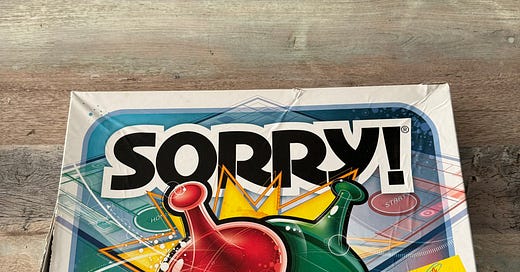Photo credit: The author. Is it any wonder this was one of my favorite games?
Please allow me to apologize in advance for wasting your time if this post doesn’t resonate with you.
I’ve always been one of those people who peppers my speech with “I’m sorry” the way a Valley Girl defaults to “like.” I’m talking about the knee-jerk kind of apology that punctuates conversation, disconnected from any actual guilty acts or omissions. As if I’m responsible for all the disappointments in the world. Did you know I even control the weather? Case in point: “I’m sorry we can’t eat on the deck tonight. It’s starting to rain.” These types of apologies are misguided attempts to be polite, or to acknowledge and diffuse less-than-ideal circumstances. They’re benign, but overuse becomes irritating because we all know the speaker hasn’t done anything for which they’re contrite. They’re, like, a place marker, like, well, “like.”
The gray area of sorry is when we apologize for some minor aspect of our behavior that wouldn’t rise to a level of culpability requiring the listener’s forgiveness. My specialties include “I’m sorry to bother you” or “Sorry if I talked too much.” Like the routine sorry, these sorries don’t spring from a sense of true remorse. They’re a way to beat someone to the punch before they form a negative thought, criticize you, or (quelle horreur!) get mad at you. In other words: “In case you feel annoyed by me at any time during our interaction, I just want you to know up front that I already realize how annoying I can be. Please don’t let this stop you from deciding I’m a lovely person.” This type of faux apology makes the average, good-natured listener uncomfortable because it broadcasts the speaker’s insecurity. It also assumes the listener is an impatient, intolerant, or critical person who will rush to judgment. Ouch.
Where did we get the idea we had the authority to ask forgiveness for circumstances that have nothing to do with us anyway? I hear over-sorrying much more from women than men, probably because so many of us were taught to be the smoother-outers, the ‘let’s keep everything pleasant here’ mediators in the room. The term ‘codependent’ gets tied to that mindset, but I’m not sure we need a label to know it’s not beneficial to over-apologize in any context, personal or professional.
On a sidenote, we over-apologizers blend in better in the UK, where “Sorry” is an equivalent to “Excuse me” or “Pardon me.” I once attended a play in a West End theatre, where several patrons in the middle of the row made their way to and from the distant aisle, prompting choruses of “Sorry! Sorry. Sorry. Terribly sorry!” Drive-by apologies also sound more sophisticated with an English accent. John Cleese articulated the gold standard (insincere) apology as he dangled from a window in A Fish Called Wanda. If you’re too young to remember that movie, check out the link below (content warning: Kevin Kline is a “true vulgarian,” as Cleese notes.)[1]
Over-sorrying is a habit one should break regardless of age, but if you’re a middle-aged woman who still apologizes when someone else bumps into you, the best time to quit is now. Many of us in this demographic already sense society looking past us, as if our we accidentally donned the invisibility cloak with our HRT gel. There’s no need to fuel the idea that we shouldn’t take up physical or metaphorical space.
Of course, none of this should be interpreted to mean we shouldn’t freely offer honest-to-goodness, sincere apologies that spring from a true sense of remorse. As for my willingness to speak those? I’m sorry. That would require a whole different post.






This story is my life. Very enjoyable and relatable!
Wonderful! Well written and so true! A great read and funny as well!